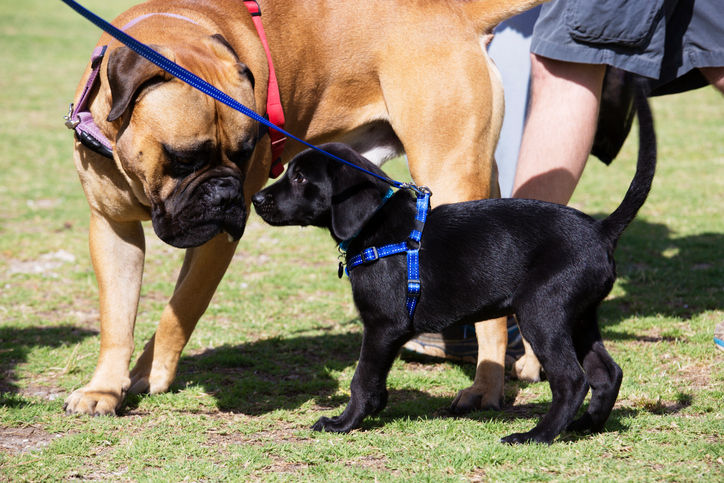 Proper socialization is essential if you hope to raise a happy, well-balanced dog. Unfortunately, most pet owners have the wrong idea about how to socialize their dogs and inadvertently do more harm than good in this process. The moment you get a new puppy the importance of socialization is drilled into your head; you hear it from your veterinarian, at puppy class, and so on. You’re encouraged to expose your new puppy to all sorts of other dogs, animals, people, places, and noises during his critical developmental periods. And you should. But keep in mind, the purpose of socialization is to teach your dog to be comfortable in all kinds of situations. How you go about this will determine how your dog perceives the world. Do it wrong, and you end up creating problems.
Proper socialization is essential if you hope to raise a happy, well-balanced dog. Unfortunately, most pet owners have the wrong idea about how to socialize their dogs and inadvertently do more harm than good in this process. The moment you get a new puppy the importance of socialization is drilled into your head; you hear it from your veterinarian, at puppy class, and so on. You’re encouraged to expose your new puppy to all sorts of other dogs, animals, people, places, and noises during his critical developmental periods. And you should. But keep in mind, the purpose of socialization is to teach your dog to be comfortable in all kinds of situations. How you go about this will determine how your dog perceives the world. Do it wrong, and you end up creating problems.
On a mission to socialize their new puppy and armed with good intentions, many owners trail their puppies down the street letting them meet every Tom, Dick, and Mary along the way, as well as every dog they see, on leash, nose-to-nose, even crossing Invisible Fence lines to greet dogs in their own yards (who are often barking wildly as the puppy approaches the fence line). And they’re left completely dumfounded when they end up with a leash reactive dog. “But I took him everywhere and introduced him to everyone.” Yes, that is precisely the problem. This is a good way to get into trouble and end up with a dog that goes ballistic every time it sees another dog or person coming its way, either out of uncontrollable excitement or insecurity. Why? Because if you socialize in that manner, you have no control over the variables and you can’t ensure your puppy will have positive experiences. You have no idea how a stranger or a dog you don’t know will react to your puppy. You need to control the environment so you can control what your dog learns. What does your puppy learn if a well-meaning stranger towers over him, bellowing greetings, maybe even stomping his feet to excite the puppy, and insisting on petting him? Or a small child yanks on his ears? Strangers are terrifying and best avoided. What does your puppy learn if that gregarious Golden Retriever you meet on your walk body slams him and knocks him to the ground? Or the dog that is supposedly “fine with other dogs” suddenly lunges at him aggressively? Other dogs are frightening. And he will become reactive, trying to ward off those frightening dogs and people. In the worst case scenario, a puppy traumatized by an aggressive dog will often become aggressive himself.
Your objective in socializing your puppy is to create positive experiences in a wide range of new locations and situations. This doesn’t necessarily require direct interaction with other dogs and people; you want your puppy to learn to be comfortable while he is around new things. Then you can allow the direct interactions with neutral, stable dogs and people who won’t scare the bejesus out of your puppy. As you take your puppy into the world to socialize him try to make all of the experiences happy ones. As you take him to into a store, outdoor café, park, and the vet’s office (before his first appointment), keep him focused on you as you offer him treats. Your puppy will learn not to be too concerned by new environments. Expose him to new surfaces (walk over a tarp, a slippery floor, etc). Have him work near a dog (or dogs) you know is stable, initially ignoring the dog and focusing on you. Again, you should be giving him plenty of treats. Once he is comfortable with this, he can meet the dog. Keep him engaged as you work near strangers you know will ignore him, then have them offer him a treat in the same manner you would. Always try to control the variables. If you don’t know how a person or dog will react to your puppy, keep your distance. Your puppy will learn to accept new environments, people, animals, loud trucks, motorcycles, bicycles, and so on, without getting stressed. And don’t stop socializing your puppy when the critical development period ends. If you socialize your puppy and then take him nowhere for several months, you might find you have to start all over again. Dogs are constantly learning from their environments and socialization is an on-going process.